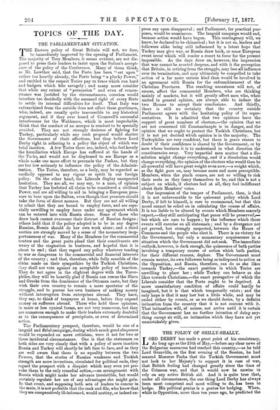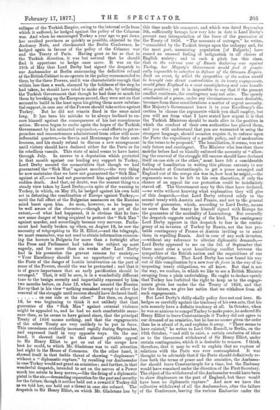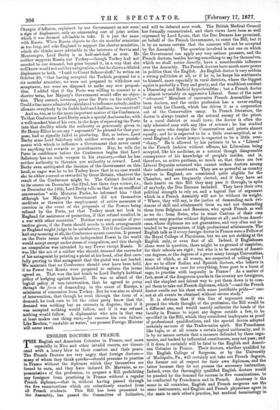THE POLICY OF SHILLY-SHALLY.
LORD DERBY has made a great point of his consistency. As long ago as the 25th of May,—before any clear news of the Bulgarian massacres had reached this country,—as he told Lord Granville, on the first evening of the Session, he had assured Musurus Pasha that the Turkish Government must not look to her Majesty's to support it in case of war, that British feeling had changed greatly since the time of the Crimean war, and that it would now be unwise to rely on any active British aid. And it is quite true that, under all circumstances, the one thing Lord Derby has always been most competent and most willing to do, has been to hedge. His political genius is a genius for hedging. When, while in Opposition, more than ten years ago, he predicted the collapse of the Turkish Empire, owing to the internal evils from which it suffered, he hedged against the policy of the Crimean war. And when he encouraged Turkey a year ago to put down her revolted provinces as quickly as possible, objected to the Andrassy Note, and checkmated the Berlin Conference, he hedged again in favour of the policy of the Crimean war and the Treaty of Paris. Having gone so far as that in the Turkish direction, it was but natural that he should find it opportune to hedge once more. It was on the 19th of May that Lord Derby had signed the despatch to our Ambassador at Berlin announcing the definitive refusal of the British Cabinet to co-operate in the policy recommended to them by the three Powers, and it was characteristic enough that within less than a week, alarmed by the boldness of the step he had taken, he should have tried to make all safe, by informing the Turkish Government that though he had done so much for them by breaking up the European accord, they were not on that account to build in the least upon his giving them more substan- tial support, in case any of the Powers should take action against Turkey. But he did not remain fixed in the same mind long. It has been his mistake to be always inclined to en- sure himself against the consequences of his last conspicuous action. He soon began to excite again the hopes of the Turkish Government by his animated reproaches,—and efforts to get re- proaches and remonstrances administered from other still more influential quarters,—to Servia and Montenegro for their rest- lessness, and his steady refusal to discuss a new arrangement until victory should have declared either for the Porte or for its rebellious vassals. This state of mind seems to have lasted through July. In answer to a deputation which protested in that month against our lending any support to Turkey, Lord Derby assured the memorialists that though we had guaranteed the "Sick Man" against murder,—the very thing he now maintains that we have not guaranteed the " Sick Man" against at all,—we had not guaranteed him against suicide or sudden death. And that, no doubt, was the nearest thing to a steady view taken by Lord Derby,—in spite of the warning to Turkey, in which, on May 25, he hedged against his own bold act in defeating the combination of Europe against Turkey,— until the full effect of the Bulgarian massacres on the Russian mind burst upon him. As soon, however, as he began to be well aware of the character,—though not as yet of the extent,—of what had happened, it is obvious that he fore- saw some danger of being required to protect the" Sick Man" against murder, and accordingly became very nervous. Parlia- ment had hardly broken up when, on August 18, he saw the necessity of telegraphing to Sir H. Elliot,—and the telegraph, we must remember, was not used to obtain information concern- ing the horrors in Bulgaria for more than a fortnight after the Press and Parliament had taken the subject up most eagerly, and for more than six weeks after Lord Derby had in his possession the gravest reasons for anxiety,— " Your Excellency should lose no opportunity of warning the Porte of the danger of hostile intervention on the part of some of the Powers, should the war be protracted ; and that it is of grave importance that an early pacification should be arranged." That, it will be seen, is in a wonderfully different tone to the benign serenity and impartiality expressed by him two months before, on June 12, when he assured the Russian Envoy that in his view "nothing remained except to allow the renewal of the struggle until success should have declared itself.
on one side or the other." But then, on August 18, he was beginning to think it not unlikely that that guarantee of the "Sick Man" against external violence might be appealed to, and he had no such comfortable assur- ance then, as he seems to have gained since, that the principal Treaty of 1856 means nothing, and that the engagements of the other Treaty are very unlikely to be put in force. This uneasiness evidently increased rapidly during September, and expressed itself in very opposite ways. On the one hand, it showed itself in that almost pitiable appeal to Sir Henry Elliot to get us out of the scrape how best he could, to which Mr. Gladstone was to call attention last night in the House of Commons. On the other hand, it showed itself in that feeble threat of showing "displeasure" without a "diplomatic rupture," by recalling our Ambassador in case Turkey would not grant an armistice ; and further, in that wonderful despatch, intended to act on the nerves of a Power much too astute to keep nerves,—like the firing of a diplomatic pistol in the air,—demanding reparation for the past and security for the future, though it neither held out a reward if Turkey did as we told her, nor held out a threat in case she refused. The despatch to Sir Henry Elliot, on which Mr. Gladstone has by this time made his comment, and which was dated September 5th, sufficiently betrays how very late in date is Lord Derby's present easy interpretation of the force of the guarantee of the Treaty of 1856. The accounts of outrages," he writes, "committed by the Turkish troops upon the unhappy and, for the most part, unresisting population [of Bulgaria] have roused an unusual feeling of indignation in all classes of English society ; and to such a pitch has this risen, that in the extreme case of Russia declaring war against Turkey, her Majesty's Government would find it practi- cally impossible to inteifere in defence of the Ottoman Empire. Such an event, by which the sympathies of the nation would be brought into direct contradiction to its treaty engagements, would place England in a most unsatisfactory and even humili- ating position ; yet it is impossible to say that if the present conflict continues, the contingency may not arise. The speedy conclusion of a peace, under any circumstances most desirable, becomes from these considerations a matter of urgent necessity. Her Majesty's Government leave it to your Excellency's dis- cretion to choose the arguments which you shall employ, but you will see from what I have stated how urgent it is that the Turkish Ministers should be made alive to the position in which the conduct of their own authorities has placed them, and you will understand that you are warranted in using the strongest language, should occasion require it, to enforce upon the Porte the expediency of a pacific policy, and of moderation in the terms to be proposed." The humiliation, it seems, was not only future and contingent. The Minister who less than three months before had so blandly enforced the necessity of "allow- ing the renewal of the struggle till success should have declared itself on one side or the other," must have felt a considerable feeling of humiliation in writing this piteous entreaty to our Ambassador at Constantinople, to get a peace arranged and England out of the scrape she was in, how best he might,—the arguments were to be left to his own discretion, if only the chance of an appeal for our protection could be indefinitely. staved off. The Government may by this time have declared, — we write without knowing what explanation they will give of this despatch,—that Lord Derby referred solely to the second treaty with Austria and France, and not to the general treaty of guarantee, which, according to Lord Derby, means no more than the treaty he himself signed with Europe for the guarantee of the neutrality of Luxemburg. But assuredly the despatch suggests nothing of the kind. The contingency Lord Derby appears in this despatch to fear is the contin- gency of an invasion of Turkey by Russia, not the less pro- bable contingency of France or Austria inviting us to assist them in repelling Russia. And in case of any such invasion, — without any reference to ulterior diplomatic demands,— Lord Derby appeared to see on the 5th of September that there must arise a most humiliating conflict between the sympathies of the British nation and the requisitions of our treaty obligations. That Lord Derby has now found his way out of this complication by a new tour de force in the way of in- terpreting treaty obligations, we all know. But that is not the way, we confess, in which we like to see a British Minister escaping from a plain undertaking. He ought to declare openly that Turkey has forfeited the right to keep us to the engage- ments given her under the the Treaty of 1856, and that for the future, we give her notice that we withdraw from all such engagements.
But Lord Derby's shilly-shally policy does not end here. He hedges so carefully against the tendency of his own acts, that his acts scarcely have a definite tendency at all. In October, when he was so anxious to compel Turkey to make peace,he ordered Sir Henry Elliot to leave Constantinople if Turkey did not agree to our demand of an armistice, but he has no sooner given the order than he is afraid of it, and explains it away. "There seems to have existed," he writes to Lord Odo Russell, to Berlin, on the 16th October, "and still to exist, a certain confusion of ideas as to the threatened withdrawal of Sir Henry Elliot, under certain contingencies, which it is desirable to remove. I think, therefore, that it may be well to explain that no rupture of relations with the Porte was ever contemplated. It was thought to be advisable that if the Porte should definitively re- fuse both the terms of peace and the armistice, the Ambassa- dor should leave Constantinople for a time, but the Embassy would have remained under the direction of the First Secretary.
The object of the withdrawal of the Ambassador would have been to show displeasure on the part of England, but there would have been no diplomatic rupture." And now we have the collective withdrawal of all the Ambassadors, after the failure of the Conference, leaving the various Embassies under the
Charges d'Affaires, explained by our Government as not even -a sign of displeasure, only an unmeaning sort of joint action which it was deemed advisable to take. It is just the same with Russia. When Russia objects to the six months' armistice as too long, and asks England to support the shorter armistice, which she thinks more advisable in the interests of Servia and Montenegro, Lord Derby is as half-and-half as ever. He neither supports Russia nor Turkey—though Turkey had not acceded to our demand, but gone beyond it, in a way that she well knew would not suit her antagonists,—but he shows a diluted displeasure to both. "I said to Count Schouvaloff," he writes on October 20, "that having accepted the Turkish proposal for a six months' armistice, we were not prepared to withdraw our acceptance, nor were we disposed to make any new proposi- tion. I added that if the Porte was willing to consent to a shorter term, her Majesty's Government would offer no objec- tion. They cannot, however, press the Porte on the subject." Could a line more admirably calculated to influence nobody, and to alienate everybody by its feeble half-and-halfness, be conceived?
And so, too, as to the more important matter of the Conference. To that Conference Lord Derby sends a special Ambassador, with a well-marked bias of his own, in the hope of squeezing the Porte into that docility which the authority so generously given to Sir Henry Elliot to use any "arguments" he pleased for that pur- pose, had so signally failed in producing. But, as before Lord Derby arms Lord Salisbury with neither rewards nor before, with which to influence a Government that never cared for anything but rewards or punishments. Nay, he tells the Porte in confidence before the Conference begins that Lord Salisbury has no such weapon in his armoury,—that he has neither authority to threaten nor authority to reward. Lord Derby even anticipated the decision of the Government on this head, so eager was he to let Turkey know that in no case would she be either coerced or rewarded by Great Britain, whatever the result of the Conference might be. The Cabinet decided as to its oourse on December the 22nd, but three days sooner, i.e., on December the 19th, Lord Derby tells us that "in an unofficial conversation" with Musurus Pasha, he informed him "that although her Majesty's Government did not themselves meditate or threaten the employment of active measures of coercion in the event of the proposals of the Powers being refused by the Porte, yet that Turkey must not look to England for assistance or protection, if that refusal resulted in a war with other countries." Neither was any promise of pro- tection given, if the Porte should accede to such arrangements as 'England might judge to be satisfactory. Yet if the Conference had any meaning at all, the Conference meant coercion. It pressed on the Porte terms which no independent Power in the world would acoeptexcept under stress of compulsion, and this though no compulsion was intended by any Power except Russia. It was like the act of a soldier who should demand the surrender of his antagonist by pointing a pistol at his head, after first care- fully proving to that antagonist that the pistol was not loaded. We maintain that no Conference should ever have been held, if no Power but Russia were prepared to enforce the terms agreed on. That was the last touch to Lord Derby's habitual policy of hedging against himself. He was so afraid of the logical policy of non-intervention, that he agreed to going thrzisgh the form of demanding, in the name of Europe, a minimum of concession from Turkey. But he was also so afraid of intervention, that though he went through the form of a demand, he took care to let the other party know that the demand was nothing but an entreaty in disguise, that if it was aceepted nothing would follow, and if it was refused nothing would follow. A diplomatist who acts in that way at least makes one thing sure,—he ensures his own failure. Like Reuben, " unstable as water," our present Foreign Minister will never excel.




































 Previous page
Previous page